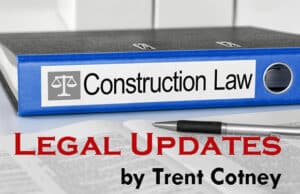The rights and responsibilities of a subcontractor were under scrutiny in a recent case (Katz v. FM Construction, Case No. 19-27439) reviewed by the U.S. Bankruptcy Court, District of New Jersey. This case is an interesting example of issues involved with third-party complaints and counterclaims, further complicated by one party being in Chapter 11.

Background of the Case
Hollister Construction Services, LLC (Hollister), a commercial construction services firm, was doing business with FM Construction Group, LLC (FM), a subcontractor. FM had a master agreement contract with Hollister, which addressed all projects involving both parties. They agreed to execute separate project-specific contracts for particular details on given projects as needed. In September 2017, Hollister signed a construction management contract with the owners of residential buildings in Harrison, New Jersey. Hollister and FM then entered into a project-specific subcontracting agreement. FM agreed to provide specified services to Hollister for that particular project. In September 2019, the project was still underway when Hollister filed for bankruptcy under Chapter 11.
A few months after that filing, in December 2019, Hollister, the property owner, FM, and other subcontractors signed a settlement agreement. According to that agreement, FM would receive a 60% reduction in the fees owed before the filing, but the subcontractor would be fully compensated for work completed after the filing.
As time passed, the project was delayed for several reasons. Therefore, FM could not resume its work. Then Hollister and the owner resolved the issues, amended the settlement agreement, and extended the completion date. However, FM claimed it was not consulted about the contract revisions and never signed the amended agreement. The subcontractor also contended that although it was ready to continue work, the project was not in the necessary condition for it to do so. Eventually, Hollister sent FM a “48 Hour Notice to Perform” letter. It contended that FM failed to perform per the subcontract and the settlement agreement. Hollister then ended the subcontract with FM, noting it was terminated for cause.
As this was going on, Hollister’s bankruptcy case proceeded. The U.S. Bankruptcy Court approved the plan of liquidation and appointed Bernard Katz (Trustee) as the trustee to oversee Hollister’s assets and settle its business. As part of that confirmation, claim holders were not allowed to file claims against Hollister or the Trustee for any issues before the plan’s effective date, April 30, 2021.
After Hollister terminated FM, it hired another subcontractor to complete the work. On January 31, 2022, the Trustee filed a complaint against FM. Its intent was to recover Hollister’s costs for completing FM’s scope of work. Hollister stated the Trustee incurred more than $500,000 above the contract balance to cover FM’s obligations. FM filed a response, and the parties tried mediation, but it was unsuccessful. FM then filed counterclaims against Hollister, as well as a third-party complaint against the property owner.
Specifically, FM accused Hollister of 1) breach of contract, 2) unjust enrichment, 3) breach of implied covenant of good faith and fair dealing, 4) quantum meruit, and 5) declaratory judgment that termination was wrongful and done in bad faith. It also alleged 6) fraudulent inducement. FM’s claims against the owner were similar.
In response, the Trustee filed an opposition to FM’s motion. It then filed a cross-motion through which it sought to enforce the court’s directions and the parties’ agreements. The Trustee stated that FM was bound by the terms of the liquidation plan and the parties’ agreements. Therefore, it contended that FM was precluded from filing any claims for issues before the plan’s effective date. The Trustee went on to assert that FM’s claims should have been barred as a matter of law.
What the Court Decided
In February 2023, the court began by reviewing FM’s claims against the property owner. It considered whether it had the jurisdiction to address claims between FM and the owner, given that it is a bankruptcy court and these parties were non-debtors. It determined it did not have jurisdiction in the matter since the third-party complaint was not directly related to the liquidation plan. Therefore, it denied FM’s motion, with prejudice.
Next, the court reviewed the counterclaims against Hollister. Regarding the fraudulent inducement claim, FM alleged that Hollister knew it could not manage the project. However, according to the Federal Rule of Civil Procedure 9(b), there is a heightened pleading standard for fraud accusations, and specific details must be provided. Since those specifics were not offered, the court denied that claim, without prejudice.
As for the other five claims, since they accrued prior to the plan date, the court denied them as affirmative claims. However, during the court proceeding, FM explained it was not seeking claims that “go beyond its preserved setoff or recoupment rights.” The court acknowledged that the confirmation order and liquidation plan allow for setoff and recoupment rights. In this case, setoff was not applicable, but recoupment was. Therefore, FM’s motion regarding claims 1 through 5 was granted, but it was limited to its right to recoupment “as a means to extinguish or reduce the Trustee’s recovery herein.” The Trustee’s cross-motion was denied.
Final Thoughts
It isn’t every day that a subcontractor finds itself in a situation like this one—a delayed project, questionable termination, and bankruptcy for the other party. However, it is interesting to understand what the court granted and what it did not. The fraudulent inducement claim did not hold because FM lacked the documentation and specifics. As always, paper wins the day. Had FM kept meticulous records and provided them to the court, the decision might have been different. But in the end, it was still able to pursue recoupment. So even if the battle seems to be uphill and unwinnable, it is often worth the fight.
The information contained in this article is for general educational information only. This information does not constitute legal advice, is not intended to constitute legal advice, nor should it be relied upon as legal advice for your specific factual pattern or situation.
Trent Cotney is a partner and Construction Practice Group Leader at the law firm of Adams and Reese LLP a. You can reach him at trent.cotney@arlaw.com or call 866.303.5868.

Trent Cotney
Article provided by: https://acprosite.com/u-s-bankruptcy-court-rules-on-subcontractor-counterclaims-by-trent-cotney/

